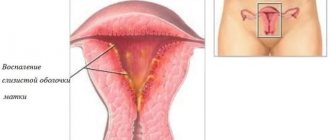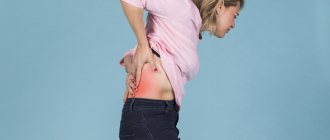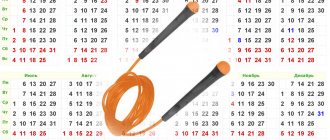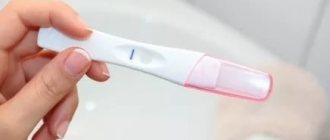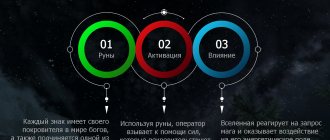Every month women have their period. Nobody likes this period, and some look forward to it with fear because of the terrible cramping pain. There are times when a representative of the fairer sex is forced to stay at home and call an ambulance because she feels terrible. What causes severe pain during menstruation, how to prevent their occurrence and relieve cramps if they have already appeared, you need to know in order to be able to help yourself before visiting a doctor .
Why does my lower abdomen hurt?
Dysmenorrhea is pain in the lower abdomen that accompanies menstruation. They arise due to the fact that within a month the epithelium grows in the uterus, to which the embryo will attach after fertilization, and if this does not happen, the body gets rid of it through bleeding. Doctors have found that it is impossible to get pregnant on the first day of the cycle.
During menstruation, a woman experiences slight malaise, discomfort in the abdomen and fatigue. However, this does not prevent her from adhering to the usual rhythm of life. If your critical days are very painful and your cycle is irregular, then you need to consult a gynecologist.
How to eliminate period pain
If your stomach hurts unbearably during menstruation, the question is “what to do?” becomes a priority, since the rhythm of modern life does not allow women to relax. The pharmaceutical industry offers to eliminate discomfort with suppositories, tablets and thermal patches.
Candles
For women who do not like to take pills for any reason, suppositories with an analgesic effect are suitable.
During menstruation, they are introduced into the vagina, where the active substances act locally, eliminating pain and inflammation. The preparations have a creamy texture, which makes them easy to use.
Paracetamol exhibits analgesic and anti-inflammatory effects. To relieve pain during menstruation, it is used several times a day. One suppository is placed in the vagina with obligatory observance of a 4-hour interval.
Cefekon D is an analogue of Paracetamol. The medicine quickly relieves menstrual pain syndrome and relieves inflammation. If you have a headache, it also removes it.
Pills
If you decide to take pills for abdominal pain during menstruation, we recommend considering three groups of drugs against pain:
- Antispasmodics – relieve spasms in the uterus, accelerate the release of mucous secretions, and reduce the tone of the uterus. In some cases, the duration of critical days is reduced, but the bleeding will be profuse. Antispasmodics include No-shpa, Papaverine, Buscopan and Spazmalgon.
- Analgesics – relieve pain, nausea, weakness and fever. What to drink during painful periods: Baralgin, Analgin, Menalgin, Novalgin.
- Anti-inflammatory drugs - relieve pain during menstruation, but they must be taken in the premenstrual period. The tablets prevent ill health, but are not suitable for patients with gastric ulcers. If there are no contraindications on the eve of menstruation, you can take Diclofenac, Aspirin, Ketonal, Ibuprofen, Paracetamol.
Plasters
The analgesic effect of thermal patches is explained by the effect of heat. The adhesive tape is comfortable to wear on the body, and heating the abdominal area does not harm the body.
In folk medicine, a heating pad is used to eliminate menstrual pain, but it cannot be used in the workplace or in other conditions when you cannot lie down and relax.
Assortment of thermal plasters for painful critical days:
- Extraplast.
- Frauplast.
- ThermaCare.
- CureTape.
There are no universal methods for dealing with pain during the menstrual period. Some women are helped by a warm bath, others by a glass of cognac, and still others try not to drink coffee and alcohol on menstrual periods.
Diet
If on critical days you don’t want to saturate your body with “chemicals,” you can follow a diet that includes switching to vegetarian food. To reduce pain symptoms during menstruation, a few days before their onset you should avoid dairy and animal foods. It is useful to drink juices, especially beet and carrot juices.
On days when there is no bleeding, the body needs to be nourished with calcium and green leafy vegetables. It is undesirable for women to abuse coffee, as the drink increases psycho-emotional irritability. On menstruation days, it is better to drink aromatic herbal teas. You can prepare them from mint, chamomile, raspberry leaves, and lemon balm.
Sport exercises
If you don’t know what to do if your stomach hurts during menstruation, try to eliminate the discomfort with light exercise. It has been observed that regular exercise helps women cope with menstruation more easily. In addition to feeling good, gymnastics will give you health and a beautiful figure.
Often, women lie down during their periods and, as far as possible, stay away from household chores.
But the discomfort still persists, since it is physical activity that eliminates the pain. Therefore, on critical days you need to walk, squat, bend over, and do exercises. Complex, grueling exercises are not needed - everything is good in moderation. Sometimes just a few squats are enough to eliminate severe pain in the lower abdomen during menstruation.
What exercises will help relieve pain:
- Place yourself on the floor with your legs bent. Your feet should rest firmly on the floor. Gently bend your stomach up and down, keeping the muscles relaxed. Repeat the exercise 4 – 5 times.
- Take a position in which your elbows and knees rest on the floor. Lower your head in the area between your hands. Stand for 3 minutes.
- Lie on your back and raise your legs high so that they form a right angle with the wall. Place your feet against the wall, pressing your limbs tightly to the surface. Although this is difficult, to get rid of abdominal pain you need to hold in this position for 5 minutes.
- Lie on your stomach and extend your arms. Place your palms firmly on the floor. Pull your head and sternum back as far as possible. The Cobra exercise helps stretch the muscles of the back and abdomen. To relieve pain, it needs to be done 4 to 5 times.
Women who do yoga rarely complain of abdominal pain during menstruation. Also, a passion for ancient Eastern art helps to suppress depression and anxiety.
Types of pain during menstruation
There are two types of dysmenorrhea: primary and secondary.
Primary occurs within two years from the beginning of the girl’s first menstruation in her life. It is not associated with any pathologies, and the pain is natural and occurs due to the expulsion of an unfertilized egg from the ovary. This type of malaise usually disappears after the first birth. With primary dysmenorrhea, the cycle does not go astray, but remains normal and regular.
Secondary, or as it is also called, acquired dysmenorrhea, occurs due to diseases and changes in the genital organs. It appears more often in women over 30 years of age and is accompanied by cardiac arrhythmia, tachycardia and vegetative-vascular abnormalities (excessive sweating, dizziness).
If the unpleasant sensations do not change over the years, then such dysmenorrhea is called compensated. If the pain only intensifies with age, then, accordingly, it is decompensated.
Types of associated ailments
In addition to nagging pain in the genital area, menstruation may be accompanied by:
- Discomfort in the heart.
- Severe headaches or migraines.
- Fatigue quickly.
- Unpleasant sensations in the eye area.
- Sleep disturbance.
- Pressure surges.
- Irritability and depressed mood.
- Swelling.
- Mood swings.
- Pain in the lower back.
- Dizziness, nausea and vomiting.
- Increased sweating.
- Breast pain or tenderness.
- Constipation, diarrhea or other abnormalities in the gastrointestinal tract.
Folk remedies for pain during menstruation
Traditional medicine is also rich in recipes that help reduce pain during menstruation. The most popular ones include the following:
- Decoctions based on horsetail. This plant has a diuretic effect, so it relieves nagging pain during menstruation. You can also take it during PMS, it will help relieve symptoms.
- Raspberry tea is used as a remedy for pain during menstruation. This decoction creates a calming effect, also relieves headaches and tones the body. It is very easy to prepare: pour three tablespoons of dry leaves with a glass of boiling water and let it steam. After 20 minutes you can drink. Add a spoonful of honey for taste.
- Chamomile tea is also very useful; it soothes and relaxes the walls of the uterus, causing pain to disappear. You can add mint, catnip, and raspberries to chamomile.
- Applying heat to the abdomen is a dubious method, but it helps. It is best to use a heating pad, pour warm water into it and apply it to the stomach, this will relieve pain for a while, but may increase bleeding.
It is worth understanding that such remedies are good if there are no pathological factors underlying the severe pain. In case of a sharp deterioration in the condition, it is better to consult a doctor; such a symptom may signal the most serious problems.
Causes of menstrual pain
Menstrual pain can occur due to the following factors.
- Incorrect location of internal organs, in particular the uterus.
- Formed adhesions and scars after artificial termination of pregnancy (abortion).
- Heredity.
- Constant psycho-emotional stress.
- Lack of iron, calcium and magnesium in the body.
- Hormonal imbalances.
- Avitaminosis.
- Installed intrauterine device.
- Ectopic pregnancy.
- Sedentary and inactive lifestyle.
- Inflammation in the pelvis.
- Diseases such as uterine fibroids, endometriosis.
- Formation of cysts or polyps in the uterus.
- Sexually transmitted infections.
If the sensations do not interfere with the girl’s normal activity, then there is no need to worry and draw hasty conclusions. If the spasms interfere very much and cannot be tolerated, then you need to consult a specialist.
How to relieve severe pain?
First you need to determine the cause of the pain. Cycle data will help her figure it out. If there are violations, delays or irregularities, then it is worth looking for a provoking factor. In the case where the gynecologist did not find any pathological abnormalities, but pain is still observed, you need to learn to cope with it yourself.
In order not to feel severe pain during your period and improve your condition, you should act comprehensively and follow these tips:
- Pay attention to your diet. Junk food negatively affects the entire body, including the female reproductive system. Therefore, it is necessary to introduce into the diet foods rich in vitamins E and B, as well as magnesium and calcium. In addition, experts do not recommend drinking a lot of milk or eating fatty foods a few days before menstruation. It is worth paying attention to light foods, such as vegetables.
- An athletic, pumped-up body tolerates pain more easily. This has been scientifically proven, so just a few minutes a day of physical exercise strengthens the muscles of the back, pelvis and internal organs, resulting in reduced pain. During active periods, you should not overload yourself with loads; you should do physical exercises regularly, then there will be an effect.
- Analgesics can help relieve severe pain during menstruation. Menalgin, Tamipul, Nurofen, Tempalgin, Nimid, No-shpa and others are considered very effective. The drug can be selected individually, depending on the degree of pain. These remedies relieve pain and improve the general condition of a woman. But you should understand that they only remove the symptoms, without affecting the cause in any way. If analgesics do not help and the pain intensifies, then you should consult a doctor. In such cases, it would be a good idea to call an ambulance.
Treatment of dysmenorrhea
When medications no longer help to get rid of terrible symptoms and a woman is forced to give up all her duties for several days every month, then an examination by a gynecologist is vitally important.
Most of the medications your doctor will prescribe are aimed at reducing the amount of prostaglandins produced and thereby reducing the contractions of the uterus that cause attacks.
The doctor may prescribe low-dose hormonal drugs - oral contraceptives. Anti-inflammatory non-steroidal drugs and antispasmodics will also have an effect.
Some time before the onset of menstruation, the doctor prescribes complex medications that include iron, calcium, magnesium and vitamins. You need to drink them in advance so that by the beginning of the cycle the necessary microelements accumulate in the body and have the desired effect.
Electrophoresis and UHF provide pain relief and warming. These procedures will help relieve pain, but it is also better to start them in advance.
How to relieve pain during menstruation without pills
If a woman is allergic to medications, the question of what to do and how to relieve pain during menstruation without pills is especially important for her. Alternative medicine can help with painful menstruation:
- Acupuncture is an oriental method to get rid of abdominal pain during menstruation. It should only be used with the help of a competent specialist.
- Infusions and herbal decoctions can be taken and prepared independently.
- Warming up is an effective option for getting rid of pain during menstruation.
Folk remedies for pain during menstruation
Folk remedies for pain during menstruation can help eliminate discomfort without harming the body:
- Pour 0.2 liters of boiling water into 1 tsp. elecampane root Cover the container with a lid and leave for about 60 minutes. You need to drink the decoction three times a day, 30 g each. When the discomfort begins to subside, reduce the frequency of use.
- A quick way to get rid of abdominal pain during menstruation is horsetail infusion. Pour boiling water (0.3 l) into 1 tbsp. l. raw materials, leave for 1 hour. You need to drink 50 mg of the product with an interval of 60 minutes.
Causes of pain
Most often, during menstruation, the lower abdomen and lower back hurt. Migraines are also common. The pain can be tingling, pulling, aching, or spasmodic in nature. Moreover, pain may begin several days before the discharge begins.
Doctors believe that painful sensations during menstruation (dysmenorrhea) are not normal. Their main cause is a violation of hormonal metabolism: an increased content of prostaglandins increases the frequency of contraction of the pelvic muscles. But there may be other reasons, for example, infectious and inflammatory processes, including those caused by abortion, incorrect position of the genital organs, varicose veins, endometriosis. Stress, physical activity and chronic lack of sleep have a significant impact on the menstrual cycle and the intensity of pain. Pain can also be a consequence of the presence of tumors of the uterus or appendages.
For teenage girls whose menstrual cycle is not yet established, painful periods are common. But if pain haunts an adult, especially a woman who has given birth, then this is a serious cause for concern.

